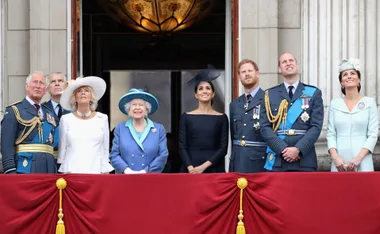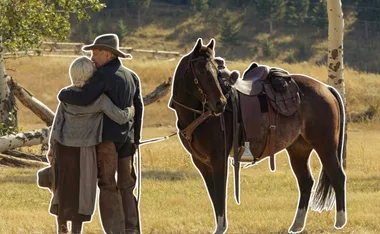A royal assassination attempt, an embarrassing afternoon for Prince Charles and a conversation with the queen about airplane food— it’s all just another day on the job for The Daily Mail’s royal correspondent Richard Shears.
It’s downtown Dunedin in 1981 and royal correspondent Richard Shears is in the crowd of well-wishers waiting to welcome Queen Elizabeth to the sleepy New Zealand town.
As the royal motorcade approaches, a loud bang sounds. Richard is convinced it was a gunshot.
In pictures: Queen Elizabeth’s visit to Australia
“I raced over to the only other reporter who was there on the road and said, ‘Did you hear that?'” Richard recalls.
“He said, ‘Yes — it sounded like a gunshot!’ We agreed to split up and try to find out what had happened.”
Richard bumped into some police officers, but they all claimed to have heard nothing. He eventually found a senior officer, who insisted his ears were playing tricks on him.
“I told the constable I’d heard a gun, but he said, ‘No, what you heard was this…’ and he knocked over a metal street sign over and it made this huge clang, which of course was nothing like what I heard.
“That’s when I knew something was going on. Something wasn’t right.”
Richard and the other reporter continued quizzing passers-by but eventually had to leave Dunedin empty-handed.
“The press bus had moved on to the airport to fly to Wellington,” he says. “I had to decide whether to stay in Dunedin and go door-knocking, or fly on with the rest of the media.
“In the end, I had to leave because I would have been in huge trouble if something happened in Wellington and I wasn’t there so I raced to the airport.”
One year later, Richard found out the truth about what happened on that day. A 17-year-old boy, Christopher John Lewis, had taken his .22 rifle into Dunedin and tried to assassinate the queen.
New Zealand police hushed the incident up and Lewis — who had held up a post office at gunpoint just days earlier with other members of his anti-royal fascist group — was charged with discharging a firearm in a public place and jailed for eight years.
In pictures: Previous royal visits to Australia
He went on to commit several other crimes, including the murder of a young mother, after his release. He committed suicide in prison in 1997.
“It was astounding,” Richard says. “This man had actually taken a shot at the queen and I was right there.”
But Richard’s royal correspondent career hasn’t always been so dramatic — he has also witnessed several funny incidents.
The one that stands out in his mind happened in the early 1980s during Prince Charles’ tour of Australia and New Zealand.
It was towards the end of a particularly long tour, and Charles was due to visit a timber mill in a tiny town in New Zealand’s north island.
In pictures: Queen Elizabeth’s visit to Australia
“We got to this mill and all the international photographers had just had it,” Richard recalls. “They all said, ‘We’re not going in there. It’s going to be the same boring thing we’ve seen all week.
“There was a young guy from The Rotorua Times or something like that and he said, ‘Well I’ve got to do it because this is my local area.”
The young photographer went inside, as the older professionals laughed and sneered. About 15 minutes later, the young man returned with a slightly stunned look on his face.
Old photographers: “See! There was nothing in there mate, was there?”
Young snapper: “Well, I did get a very nice little picture for my paper.”
Old photographers: “Yeah yeah. What was it then?”
Young snapper: “Well there was a line of workers…”
Old photographers: “Yeah, yeah, yeah…”
Young snapper: “And Prince Charles wandered along and he was shaking hands…”
Old photographers: “Yeah, yeah, yeah…”
Young snapper: “And there was one guy standing in line and he was wearing a t-shirt with a finger on it. And the finger was actually pointing at Prince Charles. And there was a slogan on the t-shirt that said ‘I’m with stupid’.”
Richard still laughs when he recounts the incident. “The old guys all looked at one another and I’ve never seen so many people rush at one man. They were shouting, ‘Give us your film, give us your film, how much do you want?’
“And this young guy did a deal with them and that picture was on the front page of every paper in the UK the next day.”
In his 30 years of covering royal tours, Richard has also had many opportunities to chat with the Her Majesty herself, sometimes about the most unlikely things.
“We used to have receptions for the press, and we’d all stand in a circle and the queen would suddenly appear,” he says. “She might say something about someone’s tie or ask me why I was never wearing a suit.
“One time we were in Brisbane and the queen had popped up and for some reason we were talking about flying and I actually said to her, ‘It’s great to fly around but the food on aeroplanes these days is nothing like it used to be’.
“I told her that on Qantas these days you just get a biscuit and a cup of tea for dinner. She said, ‘Oh that sounds terrible!'”
The next day, Richard was in the air again and faced with another abysmal meal. The elderly couple sitting next to him was just as unimpressed.
“I heard the old man say to his wife, ‘Is this all we’re getting? This is terrible!,'” he says. “And I said, ‘Yes, I’ve just been complaining to the queen about it and she thinks it’s terrible too’. And of course this old couple looked at me like I was absolutely crazy!”
Richard was thrilled when he was asked to cover what many are saying will be Elizabeth’s last tour of Australia.
“I’m not what you would call a royalist, but I do like the queen,” he says. “I think she is fantastic.
“I think the time will come when Australia will have to change. The monarchy is great, but it really doesn’t have any relevance here anymore.
In pictures: Previous royal visits to Australia
“But whatever happens, the queen will always be the most wonderful lady. Gentle, pleasant and an inspiration to everyone who sees her.”
Your say: What do you like about the queen?
Video: The queen in Perth
Newsletter conversion description. Get the latest in your inbox.










































.jpg?resize=380%2C285)
.png?resize=380%2C285)





